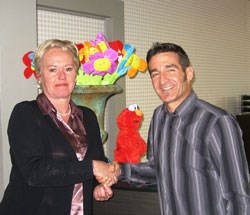
Subscribe & Follow
#AfricaMonth
In the news
Toys R Us partners with Autism SA to boost education outreach

Toys R Us South Africa director Issy Zimmerman said aligning with Autism SA was a natural partnership because the welfare of all children was at the heart of the company. "We are in the business of bringing smiles and educating children through fun and games. We are excited about this joint venture that will assist parents cope better with the challenges of raising 'differently abled' children."
Autism SA's national director, Jill Stacey expressed gratitude to Toys R Us for pledging a two-year funding partnership with the organisation to help them raise more awareness about the condition that still remains unknown by the general populace.
"It is with heartfelt admiration and appreciation that we gratefully acknowledge Toys R Us for identifying that through a partnership to financially uplift the work we do, they will be significantly influencing and improving the long-term development and prognosis of children with autism across the expanse of South Africa, Stacey said".
Working on a toy guide
According to Autism SA, autism is considered to affect one in 110 children and in South Africa every hour a child will be born that will develop the condition.
Zimmerman said Toys R Us is working on a toy guide for not just children with autism but 'differently abled' children as well which will be launched at the beginning of 2011. The toy guide will be of great assistance to parents and caregivers by identifying toys to assist with stimulation, creativity, fine and gross motor skills, thinking, creativity, language, self-esteem, social and tactile skills.
"We believe in the value of play and our hope is that by guiding parents to find toys that will optimise their child's abilities, we are, through this process, assisting in the promotion of the development of our children," he said.
What is autism?
Autism is a lifelong, complex condition that occurs as a result of
disordered brain growth, structure and development. Autism is believed to stem from a genetic predisposition triggered by environmental factors and affects 4-5 times more boys than girls.
Red Flags for possible autism in a young child
No babbling by 11 months;
• No simple gestures by 12 months (e.g. waving bye-bye);
• No single words by 16 months;
• No two word phrases by 24 months (noun + verb - e.g. "baby sleeping");
• No response when name is called, causing concern about hearing;
• Loss of any language or social skills at any age;
• Rarely makes eye contact when interacting with people;
• Does not play 'peek-a-boo';
• Doesn't point to show things he/she is interested in;
• Rarely smiles socially;
• More interested in looking at objects than at people's faces;
• Prefers to play alone;
• Doesn't make attempts to get parent's attention;
• Doesn't follow 'look' when someone is pointing at something;
• Seems to be in his/her own world;
• Odd or repetitive ways of moving fingers or hands;
• Oversensitive to certain textures, sounds or lights;
• Lack of interest in toys or plays with them in an unusual way (lining up, spinning, opening/closing rather than playing with the toy as a whole);
• Compulsions or rituals (has to perform activities in a special way or certain sequence, prone to tantrums if rituals are interrupted);
• Pre-occupations with unusual interests, such as switches, doors, fans, wheels.
Related
Autism Awareness Month: Autism spectrum disorder and the need for effective school alternatives 8 Apr 2025 Africa health body calls on Trump to honour US vaccine pledges 8 Nov 2024 Toys R Us reveals top trending toys for 2024 Festive Season 29 Oct 2024 Toys R Us shows resilience despite SA's challenging retail decline 27 Aug 2024 Babies R Us emphasises the importance of ‘Baby on Board’ car safety 17 Jul 2024 Comic Con Cape Town returns 26 Apr 2024










